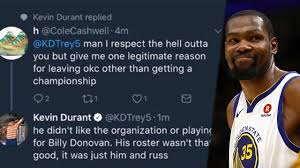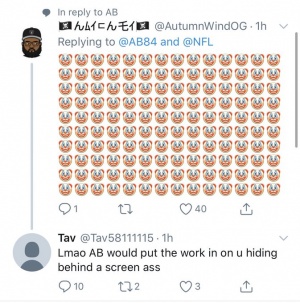Athletes and burner accounts
Burner accounts are fake accounts used by people and celebrities to talk and post in third person about themselves to shit talk people they wouldn’t shit talk on their real account.[1] Athletes commonly use burner accounts to defend themselves and to fight back against trolls who speak against them. Athletes may also use it take shots at colleagues since they know they will face harsh criticisms if they were to do so publicly. No one knows exactly which accounts are burners but it is very easy to detect based on their tweets and their activity. Burner accounts are not illegal as long as they conform to the rules and policies of that social media platform.
Contents
History
Burner accounts have been in use since the beginnings of social media. It is primarily used by celebrities and athletes as a way to maintain privacy. Often celebrities and athletes are held to a much higher standard than normal people. So if they were to say something that may seem controversial, they will be scrutinized far more than someone else. It is also a way for them to be active on social media without others knowing what they are looking at. Legendary head coach for Duke Basketball, Mike Krzyzewski, admitted to using fake twitter and instagram accounts to keep tabs on his players. The commissioner of the NBA, Adam Silver, also admitted to using fake accounts for this purpose. But nowadays, athletes are also using it to get defend themselves against people who criticize them on social media. This often leads to passionate disputes with one person not knowing that they are talking to an athlete. [2]
Famous people, especially athletes, are often put under the microscope more so than they like. They are often criticized by the public and they feel the need to defend themselves so they post something that they end up regretting. One example is when Alex Rodriguez posted an injury update on his twitter account to defend himself against the accusations that he was quitting on his team. The Yankees then told him to delete his twitter account because he posted information that was not meant to be made public.[3] Athletes often have a difficult time digesting the harsh comments directed at them and not being able to respond to the criticisms. Other athletes embrace this platform because they are able to have interactions with fans who appreciate them and they are able to block or report the fans who are abusive.
Finstas
Burner accounts are not just limited to athletes or celebrities. Nowadays, many teenagers have fake accounts on Instagram called “finstas”. This is an account where teenagers share their deeper thoughts and feelings which they would not do on their regular account. They also carefully choose who follows their accounts knowing that they don’t want everyone to see what they are posting.[4] This is very similar to a burner account because a “finsta” is where teens post things that may seem very controversial and they don’t want it to be something that defines them. There is a common understanding amongst teens that “finsta” posts are not meant to be offensive in any way but rather a way for someone to express their true feelings to a more selective audience.
Athletes using burner accounts
Kevin Durant
Even the best athletes are prone to using burner accounts. Kevin Durant is regarded as a top 3 player in the NBA but he is also known for his active use of burner accounts to clap back at trolls. He has even admitted to using them during an interview. He claims that there are some people who he needs to respond to to defend his legacy but knows that he can’t do it from his regular account because of the backlash he will receive. Durant was first caught using burner accounts in 2017 because he forgot to log out of his burner account. He was clapping back at a fan who asked him why he left the Thunder and he tweeted that he did not like his former coach and that he had no help.[5] It is his way of standing up for himself without it being traced back to him. He also says that he doesn’t regret using a burner account but regrets using his coach’s name in the tweet.
Antonio Brown
Antonio Brown has been getting criticized a lot on social media for his behavior off the field. While Brown has not confirmed that he uses burner accounts, there is ample evidence that suggests that he does indeed have one. One piece of evidence is that the burner accounts only tweets at people that have trashed the wide receiver. Furthermore, the language is very similar to the way that Brown talks on his normal account. The last piece of evidence is that the account’s handle name is Tav58111115 and Brown’s middle name is Tavaris.[6] In this case, the athlete did a poor job of concealing their identity but often many people will choose a handle name that they can remember which makes it easier to connect it back to them.
Jerry Colangelo
While Jerry Colangelo is not an athlete, he was the president of the Philadelphia 76ers until rumors about him having several burner accounts that criticized players and members of the organization. He used burner accounts to criticize his players for their performance and their health. [7]He also reportedly criticized the organization for some of their decisions. He ended up losing his job and his reputation has been tarnished. Many of his colleagues criticized his use of burner accounts and said that he should have just explained his feelings himself instead of hiding behind a fake identity.
Twitter Policy on Fake Accounts
On Twitter’s website, they clearly outline their policies on fake accounts. It says, “Twitter users are allowed to create parody, newsfeed, commentary, or fan accounts.” People are allowed to create burner accounts as long as they follow the standard rules and policies. There is no punishment for creating a fake account with a false identity. [8]
Social Media Classes
Many athletes are asked to take social media seminars upon entering the world of professional sports so they know how to behave on social media. They are told not to engage with people who post negative things about them and to think twice before posting anything. More specifically, according to Lee Gordon who provides seminars to young athletes, they are encourage to avoid burner accounts and to post as little as possible. According to Gordon, social media can destroy your career if used inappropriately. Even athletes like Roger Federer avoided joining Twitter until after studying how other famous athletes used it to avoid getting in trouble. [9]
Ethical Implications
Abuse
The first ethical problem with burner accounts is the idea of using them to get into heated arguments with other people on Twitter. One of the biggest problems with social media is when people engage in a war of words. Many disputes on social media involve the use of inappropriate language and remarks and can be viewed by almost everyone who uses the platform. Racial or sexual remarks are often used when engaging in a war of words and this is a violation of Twitter's rules and policies. It could also lead to people posting death threats such as in the case of Kyle Williams, a former NFL player for the San Fransisco 49ers. Kyle Williams had two fumbles in the NFC Championship Game agains the New York Giants that cost them the game and received hundreds of death threats on social media. It lead to the FBI investigating some of the threats and he required some security. [10] Abusing people on social media and threatening them with violence is not just unethical but is a crime.
Twitter Policy on Abusive Behavior
Twitter's website states that "You may bot engage in the targeted harassment of someone, or incite other people to do so. We consider abusive behavior and attempt to harass, intimidate, or silence someone else's voice." Furthermore they state that "You may not threaten violence against an individual or a group of people. We also prohibit the glorification of violence." Twitter also states that they reserve the right to permanently suspend any account found to be be posting violent threats.[11]
Privacy
Another ethical issue is the use of a fake identity to share your thoughts or beliefs. How far are athletes allowed to go to maintain privacy while still being able to act like a normal person? There are people who believe that if you are going to attack somebody you should do it yourself instead of hiding behind a fake account. Stephen Jackson, a former basketball player, criticized Kevin Durant for using a fake identity because he believed that he should have been “man enough” to defend himself. He called him an "egg avatar" and said that he has no respect for him. [12] Other athletes believe that they are entitled to making fake accounts because they need to be able to defend themselves.
References
- ↑ Burner account. (n.d.).https://www.urbandictionary.com/define.php?term= Retrieved on 11 March 2020
- ↑ Why famous people like Bryan Colangelo use burner accounts. https://www.inquirer.com/philly/news/bryan-colangelo-sixers-general-manager-twitter-account-burner-celebrities-why-20180530.html Retrieved on 11 March 2020
- ↑ Athletes on Twitter: How they battle the trolls, their own bad judgment. https://www.mercurynews.com/2013/07/08/athletes-on-twitter-how-they-battle-the-trolls-their-own-bad-judgment-2/ Retrieved on 26 March 2020
- ↑ What's a Finsta? We Explain This Confusing Instagram Trend. https://blog.hubspot.com/marketing/finsta Retrieved on 11 March 2020
- ↑ Everything You Need to Know About Kevin Durant's Twitter Fail. https://bleacherreport.com/articles/2733874-everything-you-need-to-know-about-kevin-durants-twitter-fail Retrieved on 11 March 2020
- ↑ Antonio Brown's Alleged Twitter Burner Account Exposed. https://www.hotnewhiphop.com/antonio-brown-s-alleged-twitter-burner-account-exposed-news.95152.html Retrieved on 11 March 2020
- ↑ What actually happened in the Bryan Colangelo Twitter saga, and what didn't. https://www.sbnation.com/2018/6/7/17438400/bryan-colangelo-burner-account-history-76ers-wife-what-happened Retrieved on 11 March 2020
- ↑ Rules and policies. (n.d.).https://help.twitter.com/en/rules-and-policies#twitter-rules Retrieved on 26 March 2020
- ↑ Athletes on Twitter: How they battle the trolls, their own bad judgment. https://www.mercurynews.com/2013/07/08/athletes-on-twitter-how-they-battle-the-trolls-their-own-bad-judgment-2/ Retrieved on 26 March 2020
- ↑ Athletes on Twitter: How they battle the trolls, their own bad judgment. https://www.mercurynews.com/2013/07/08/athletes-on-twitter-how-they-battle-the-trolls-their-own-bad-judgment-2/ Retrieved on 26 March 2020
- ↑ Rules and policies. (n.d.).https://help.twitter.com/en/rules-and-policies#twitter-rules Retrieved on 26 March 2020
- ↑ Kevin Durant Still Uses a Burner Account. https://www.si.com/nba/2020/02/06/kevin-durant-burner-account-matt-barnes-video Retrieved on 11 March 2020



